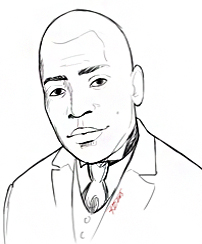Included below is a character analysis about Mr. Cyrus Montrose from the Alienist books. For basic information about Cyrus Montrose, quotes made by Cyrus Montrose, or character testimonials about Cyrus Montrose, please use the menu.
Cyrus Montrose Character Analysis
Cyrus Montrose is one of Dr. Kreizler’s employees. Although he has thus far had little chance of defining himself outside of his association with the Doctor, there is reason to believe that he would be in an interesting narrator for the “third Alienist novel” that is apparently in the works. Stevie mentions in The Angel of Darkness that Cyrus, currently single, will marry a woman named Merle Spotswood “not too long after the business of Libby Hatch [is] completed” (AoD 622). Such an event would place him in an appropriate position to narrate the next novel and would consequently allow greater insight into his character. For now, however, we have to work with what we have.
Childhood & Upbringing
Cyrus, an African American, grew up in New York and as a child saw his parents tortured and killed in the draft riots of 1863. It is described thus in The Alienist, 34:
[A]ngry hordes of white men and women, many of them recently arrived immigrants, expressed their unwillingness to fight for the causes of the Union and slave emancipation by laying hold of any blacks they could find — including young children — and dismembering them, burning them alive, tarring them.
After the death of his parents, Cyrus was taken in by an uncle who trained him to be “a piano player in a brothel that proffered young black women to white men of means” (A 34). Cyrus’s childhood was therefore not a happy one, and it is apparent from the circumstances that brought him to live with Dr. Kreizler at 283 East Seventeenth Street that these events affected him quite deeply.
Character & Personality
In 1887, Cyrus was found guilty of murdering a drunken Irish policeman with a large butcher knife. The policeman had been “taking his graft in trade” (A 34) from a prostitute whilst simultaneously beating her and calling her a “nigger bitch”. Dr. Kreizler came to Cyrus’s defence in court claiming that, in the instant he discovered the policeman, he had suffered from “explosive association” (A 34) which caused him to return to the moment of his parents’ death. Following this, he had “responded to the situation in the only way possible for a man with his background” (A 35). Impressed with this argument, the judge allowed Cyrus to work for Dr. Kreizler in order to facilitate rehabilitation. The racism Cyrus suffered in his early life, as well as that which he constantly suffers throughout the books, is therefore an important aspect of his character, one which would probably be pursued in more depth if a novel was ever narrated by him.
Cyrus is described by John Moore as Dr. Kreizler’s “valet, occasional driver, effective bodyguard, and alter ego” (A 28). Consistent with this description, throughout the novels we see Cyrus perform a wide range of duties for his employer including drawing the Doctor’s bath, laying out his clothes, and helping him with his personal papers. He shares driving duties with Stevie Taggert, Dr. Kreizler’s ward, and, when the unreliable Mrs. Leshko was housekeeper in The Angel of Darkness, he even took over preparation of the household’s morning coffee. Cyrus has also been known to use his impressive physique — he is very large and strong — to act as bodyguard for the Doctor and his friends when they require protection; his weapon of choice in this task is a set of brass knuckles.
Despite Cyrus’s criminal record and occasional role as bodyguard, he has a “controlled manner” (A 28), is somewhat cautious, and is always very calm. He does not appear to be overly fond of the quirky characters that his employer and Stevie find intriguing, but he is always tolerant and courteous. He is also intelligent and can be rather perceptive; within The Alienist, John reveals that Cyrus “had managed to get hold of much of the reading material that Kreizler had assigned to the rest of us, and he devoured it eagerly. He made no comments during meetings save when asked, but at those moments he often proved quite insightful” (A 187). As this quote reflects, Cyrus is friendly and well-respected within the investigative team, but he is also reserved; he tends not to speak unless he is spoken to. Even so, there is a lighter side to his character that Stevie describes as “slightly amused, slightly mischievous” (AoD 309), and this is never more evident than when he converses with John, as the following excerpt demonstrates.
The Angel of Darkness, 22:
Mr. Moore only frowned and looked to the doorway again. “I shall direct my comments to you, Cyrus. Knowing you to be a person of integrity, I can assume that there is some good reason for your being here.”
Cyrus nodded, with the ever-so-slightly-patronizing smile that often came onto his face when he spoke to Mr. Moore. “Miss Howard says there is, sir,” he answered. “That’s good enough for me. You’d better ask her about it.”
“And supposing I don’t wish to speak to her?” Mr. Moore grunted.
“Then, sir, you’ll be a long time getting an explanation…”
Because of Cyrus’s reserve, not much is known of his opinions or tastes; it is apparent in The Alienist that John barely knows him and does not really understand him, but even Stevie in The Angel of Darkness is not able to provide much insight into his character, only increasing his enigmatic quality. We do know, however, that he enjoys playing piano and has, as John describes, “a splendid bass-baritone voice” (A 34). He dresses smartly in tweed suits and dons a bowler hat for day-to-day wear. Regarding religion, his opinions are not discussed in the books, although his uneasy comment to Stevie in The Angel of Darkness, “I donít want to hear any more about ghosts” (AoD 283), suggests that he may hold some sort of belief in the supernatural or afterlife.
Finally, it appears that Cyrus will probably make a good father in the future: it is revealed in The Angel of Darkness that he and Merle Spotswood will have three children, one of whom will eventually be enrolled at the Harvard Medical School. Stevie explains that the Montrose children “turned the top floor of the [Doctor’s house] into a noisy nursery” and that “having children around the house did a lot of good for everyone’s spirits. Seventeenth Street was a happy place during those years” (AoD 622-3).

